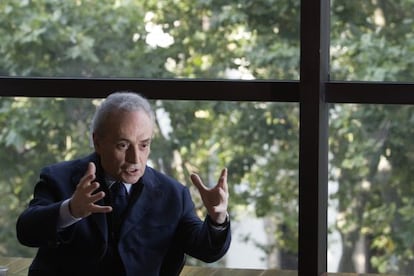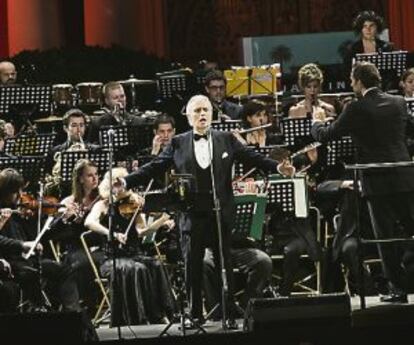“I knew that I would beat leukemia and sing again”
Opera star Josep Carreras was at the height of a magnificent career when he was diagnosed with the illness in 1987 Now he divides his life between music and fighting to find a cure

The grapes hang ripely in the Ampurdán, deep in the Catalan province of Girona. The landscape features olive groves, vineyards and gusts of the north wind known around here as the tramontana. The interview with José Carreras — one of the famous Three Tenors, along with Luciano Pavarotti and Plácido Domingo, who popularized opera in the 1990s — is taking place inside Mas Torrent, a refurbished country home that is now a luxury hotel.
Josep Carreras — to use the Catalan spelling of his name — has really dressed up for the photo op, but after that he removes his tie, unbuttons his shirt, leans back against the armchair and starts retelling the nostalgic story of someone who tasted triumph, sank into the depths of disease and rose again after winning his battle with leukemia.
He felt his musical calling as a child, and once sang at the Liceo, Catalonia's premier opera house, at age 10. In 1970 he made his debut as a tenor with Norma on the same stage. By age 30 he was already at the top of his game. But in 1987 he was diagnosed with leukemia. The tenor retired from public life for a while to undergo a tough treatment. Later he created the José Carreras International Leukemia Foundation to fight the disease. The money from many of his present performances goes to fund this initiative.
Question. On July 13, 1987 you were diagnosed with leukemia. You were 40 years old. Looking back, was that a good thing or a bad thing?
Answer. I know it may sound a little opportunistic, but after all these years I think it was for the best.
Q . Why is that?
A. I would have continued with a very intense lifestyle. But the extraordinary stimulus that this foundation has represented for me and for people who, like me, have suffered the disease, has made me a richer person and provided great compensation.
Q . You talk about stimulus. Was your career not sufficiently stimulating?
A. Yes, but in a different way. This is a human stimulation. The other one is the stimulation of the Romantic hero standing on a stage with a sword and a cape, but these things get hung on a rack and left behind in the dressing room.
Q . Was that world too phony?
A. Evidently, though imbued with the emotions and feelings that we artists try to bring to it.
Q . What is the meaning of your life, then? Being a great artist or an awareness raiser?
A. Both things build together. Being an artist, a more or less popular one, has helped raise awareness about leukemia.
Q . Although you were one of The Three Tenors, you were the least of them. You were not at ease with the new times.

A. It's possible, but I am very comfortable with what the profession has given me. I've had an important career, if you forgive the arrogance, considering where and who I worked with throughout the years, which is what really matters.
Q . I didn't mean that as criticism, I meant it as praise. You were from a different time, you had a different style. I see today's singers and they seem so exposed, so fragile to the aggressiveness of the times.
A. Some major careers are breaking down, and in many ways it is harder to find your place now than it used to be. In a way you're right. It's the reflection of more demanding times. So many marginal factors play a role...
Q . What were your priorities before being diagnosed with leukemia?
A. To me, singing was my life, my passion, my total dedication.
My generation had a little extra. We wanted to lift ourselves up"
Q . You were singing on all the great stages, with directing giants, in the company of the best... it had to get tiring.
A. No, it didn't. I was often criticized for not taking vacations. But how could I rest if one day I got a call from Claudio Abbado for a project and the next from Riccardo Muti for another? It wasn't about my career, it was about the pleasure of doing it.
Q. But it's exhausting. Did you know how to say no?
A. No, that's something I learned years later. Many people don't know how to say no, either, whether in their professional or personal lives.
Q. In what sense?
A. Because of ambition at the professional level and kindness at the personal one. I felt bad letting people down. Whether you're talking about singing or just meeting friends for dinner, you end up yielding. Experience shows you how to say no to avoid the consequences.
Q. Did that stress influence your disease?
A. It's hard to say. I simply think that my cells were not working the right way.
Q. And the fact that you didn't know how to say no — could it be because you were a humble kid who made his dreams come true and felt the need to oblige others?
A. Let's see, that's an interesting topic. People of my generation had a little something else that the later generations lacked. We wanted to lift ourselves up from a social class, to achieve what our grandparents and parents were unable to achieve because of circumstances like the Civil War. And the way to do that was to have the good fortune of possessing a talent, and fighting with real determination. Perhaps the new generations have been more complacent in that sense.
Q. What kind of a child were you?
A. Happy, very happy. We were a modest family, but lacked for nothing important. There was always food on the table and we went to school. Before the war, my father had been a schoolteacher, and afterwards, because of certain circumstances, he was unable to resume his career.
Q. Was he a republican schoolmaster? Because the [Franco regime's] repression in this area was brutal. Either you ended up six feet under or in exile, or...
A. Or else you kept quiet, that's right. Afterwards he worked for the municipal police, the Guardia Urbana, and my mother was a hairdresser.
Q. Where did you get your love of singing?
A. My grandfather was an amateur baritone. He used to talk about this time when he went to the Liceo and to the Tívoli theater; this was his passion.
Q. And soccer?
A. I used to go with my father. He was dressed in his guard uniform and I would get in for free by hiding under his coat.
Q. Too bad he couldn't get you into the Liceo for free.
If you look at a painting in the Prado, it's always the same. Opera can reinvent itself"
A. The first time I went up to the fifth floor and it was with him as well. We saw Renata Tebaldi... I was seven or eight, but I was already dreaming about singing one day. Back then I was beginning to learn how to read sheet music, but my real interest was sparked by the movies, when I saw a film about Enrico Caruso made by Mario Lanza. That made a real impact, and I started singing at home. I was so insistent that my parents figured they would see what happened if they sent me to music classes.
Q. You never really veered off that course.
A. I was so oblivious to everything that I thought I was studying music just to be a singer. Then something really funny happened. I got a call from the Liceo. I was 10 and they wanted me to sing the Retablo de maese Pedro, under the direction of José Iturbi [a Spanish conductor and pianist who found fame in Hollywood, appearing in musicals such as 1945's Anchors Aweigh). I had sung on the odd radio program [...]; I already had huge aspirations. [My parents] agreed, although they were afraid I would turn into a child prodigy.
Q. Did they always believe in you at home?
A. Always. They wanted me to study music and at high school simultaneously. Later I enrolled in chemistry, but never went to classes; I did it because of the perceived need to do something "serious." But I continued to sing until my real debut came: Lucrecia Borgia with Montserrat Caballé. My mother never got to see it, she died really young, at age 51. She was the driving force behind our family. My father remarried; he was a good man, with a great moral foundation.
Q. From Karajan to Abbado, you worked with quite a collection of conductors.
A. Karajan, Abbado, Giulini, Muti, Carlos Kleiber... there is a difference between that generation and the present: the number of rehearsals. There was an earnestness that would be hard to implement among the new generations, many hours of training...
Q. Karajan was strict - a bit of a Nazi?
A. No, it's not true he was a bit of a Nazi...
Q. Just a little bit of one?
When you are ill, you have time to think how extraordinarily wise you will become"
A. Maybe so with the people he didn't like. But he was affectionate to me, and I can only say good things about Karajan. If anyone should have power, that is the orchestra conductor. What's happening on stage is important, especially today with so much exposure, with television, with the accent on the spectacular. But it's the conductor who must wield the baton. And Karajan did that. The way I see it, he was the best; besides reigning in Salzburg and Vienna, he became a pioneer in many ways, together with Bernstein.
Q. The opera, like the Vatican, has been able to adapt to every period of time. From the castrati to the era of the stage directors, it has always found a link with the audience. Where are we at in the 21st century?
A. Opera has one great advantage. If you go to the Prado and see a painting, it's always the same. In opera, the score and the characters are the same, but each time there are different singers, a different orchestra, a different set. It reinvents itself.
Q. Had leukemia not come into your life, how would you have liked to finish the repertoire you were doing?
A. It's hard to say. Your voice changes, the repertoire adapts to who you are. It is very hard to know that. I continued to debut several operas, but if my physical form had not changed, it would have followed a natural path. At 40, I was lucky enough to have already sung most of what I liked. We artists must be aware of our own limits.
Q. The challenge in your battle against the disease was private first, then public.
A. The personal battle was tough. After months of isolation, you need to rebuild your mental strength. I was lucky enough to manage it.
Q. What was going through your mind in those months of isolation and complete solitude?
A. I took it as a parenthesis. I was confident I would make it, get back on stage, sing again.
Q. That was confidence: back then mortality rates were high.
I have nostalgia for extraordinary moments. It's like living all over again"
A. I have been very lucky.
Q. Music helped. You sang while you were holed up in your house.
A. Yes, I was in a situation where I felt that my health had deteriorated greatly: no nails, no eyebrows, no hair. But I took it as something that I had to go through.
Q. But what about the loneliness?
A. You have time to think about everything: about how consistent your thoughts and your actions are going to be in future, about how extraordinarily wise you will become as soon as you're over this... And later it turns out that it's not true. The moment you start feeling good again, you fall back into the same mistakes.
Q. What were your greatest mistakes?
A. We could be sitting here until tomorrow morning if I told you... Too much of a rush to sing certain operas... I greatly admire children who go through this disease. They mature in an extraordinary way. They are the ones comforting their parents.
Q. Your name has been associated with opera and leukemia in equal parts. Does this bother you or motivate you?
A. It doesn't bother me at all, I had the good fortune to win the battle. I had so many shows of support and affection that I felt indebted to society and to the scientific and medical community. The best way to show my gratitude was to do what I do, to fight against it.
Q. There is a curious anecdote about the time you went to see former Prime Minister Felipe González to drum up support and he told you about passing the collection plate. Can you tell me about that?
A. That was great. He organized a meeting with top businesspeople and told me: you make the beautiful speech, and I'll pass the collection plate later. And that's the way it was.
Q. How does a prime minister pass the collection plate?
A. If there was any prime minister who could ever do it, it was him. He brought together bankers, state and private companies, and told each one how much they had to contribute. You, 25, you 50, and so on. Just like that. From this dinner, held in 1989, we collected 800 million pesetas (4.8 million euros). This allowed us to get off to a flying start.
Q. Was the beginning tough?
A. Yes, but now we get funding through membership, corporate sponsorship and my recitals, all of which have given us some savings that we are using to do some things right now. We are supporting a research institute in two campuses: Badalona, with a building covering 8,500 square meters that will cost us 14 million euros, and another one at Barcelona's Clínico [Hospital]. We can do big things here.
Q. But you won't last forever, nor will you be able to lead the fundraising efforts with your concerts.
A. Obviously not, that's what the members are there for. Other singers are helping too - Plácido Domingo, for instance.
Q. The issue of state grants is getting tough.
A. These are evidently not the best times for it. Right now we have 40,000 members.
Q. Not to mention the fact that the current government is not exactly betting on research as a production model for the country.
A. My modest point of view is that research is essential to everyone. Any initiative that supports it plays a fundamental role. Not even the wealthiest countries in the world can cover all their research needs, and they need to rely on private contributions because governments cannot reach everywhere, especially at times like these.
Q, Going back to opera, does time stand still up there on the stage?
A. Let's see if I can explain. A singer who is playing a role is in a state of trance. If you get under Werther's skin, then you are Werther in terms of your feelings, but at the same time your brain is giving you orders that you're automatically registering, like "Careful here, don't fall there, don't make a mistake with the text, pay attention to the conductor..."
Q. Does nostalgia weigh heavily when you start thinking that you can't sing as often any more?
A. Why should nostalgia weigh heavily? It can be enjoyed as well — there is a certain joy to nostalgia. I have nostalgia for extraordinary moments. It's like living all over again; it's a positive thing to me. Not everything lasts forever, and those of us who were lucky enough to have been able to deliver on their promise are feeling good about it right now.
Tu suscripción se está usando en otro dispositivo
¿Quieres añadir otro usuario a tu suscripción?
Si continúas leyendo en este dispositivo, no se podrá leer en el otro.
FlechaTu suscripción se está usando en otro dispositivo y solo puedes acceder a EL PAÍS desde un dispositivo a la vez.
Si quieres compartir tu cuenta, cambia tu suscripción a la modalidad Premium, así podrás añadir otro usuario. Cada uno accederá con su propia cuenta de email, lo que os permitirá personalizar vuestra experiencia en EL PAÍS.
¿Tienes una suscripción de empresa? Accede aquí para contratar más cuentas.
En el caso de no saber quién está usando tu cuenta, te recomendamos cambiar tu contraseña aquí.
Si decides continuar compartiendo tu cuenta, este mensaje se mostrará en tu dispositivo y en el de la otra persona que está usando tu cuenta de forma indefinida, afectando a tu experiencia de lectura. Puedes consultar aquí los términos y condiciones de la suscripción digital.









































